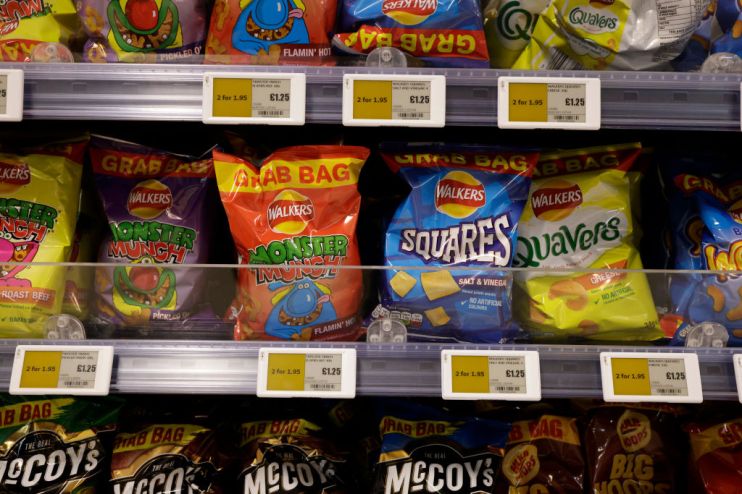Calorie labelling to cost British businesses ‘tens of millions’ each year

The Prime Minister’s announcement that restaurant and takeaway firms must introduce calorie labels on their menus will cost British businesses “tens of millions” of pounds each year, according to a new report.
Boris Johnson yesterday announced the government will introduce compulsory calorie labels for restaurant, supermarket and takeaway meals as part of measures to crack down on Britain’s obesity problem.
Compulsory calorie labels on restaurant and takeaway meals will be imposed over the next 12 months on all chains with more than 250 staff.
Meanwhile, a 9pm watershed on junk food adverts also announced yesterday is expected to take two years to implement, as ministers seek to give companies time to make food healthy enough to promote.
However, an impact assessment report for the proposals published today said that compulsory calorie labels will cost British companies up to £2.2bn over the next 25 years.
In a review of the government’s weight loss plans, the Regulatory Policy Committee (RPC) said the new measures will cost businesses £600,000 to implement calorie labelling, £100,000 in staff familiarisation costs, and £100,000 in menu redesign and printing costs over the next year.
RPC added that food companies will have to introduce calorie calculators that could carry “ongoing costs” of more than £500,000 each year.
It said the new measures will also require local authorities to carry out premises inspections to check businesses are adhering to the new rules, which could cost taxpayers around £1.6m over the next 25 years.
The sweeping plans are expected to save the NHS £4bn over that timeframe, with further savings of £5.7bn to individuals.
However, industry figures have warned that businesses should not carry the financial burden of tackling Britain’s obesity problem.
The British Beer and Pub Association (BBPA) said that the measures would be “prohibitively expensive” and that “making calorie labelling mandatory for all beer is unnecessary and burdensome”.
Emma McClarkin, chief executive of the BBPA, said: “Forcing pubs to display calorie content will likely reduce the food offer available to customers. It will be prohibitively expensive for pubs to implement, especially when they have had nearly four months without trade due to the lockdown.
“As our sector recovers now is not the time for burdensome red tape and we would urge the government to look at more collaborative ways to work with our sector instead, including promoting the growing range of low and no alcohol beers.”
Katrina Anderson, a lawyer from law firm Osborne Clarke’s food team, added that the move would likely result in lobbying for a lifting of food and drink restrictions.
“The consultation on alcohol calorie labelling is another example of the shift away from childhood obesity to tackling obesity across the entire population. Although many major drinks manufacturers are voluntarily electing to show calories mandating this is a radical move which will not be popular in the drinks industry,” said Anderson.
“It is likely that the drinks industry will respond by lobbying for a lifting of restrictions on health claims such as low sugar on alcohol packaging.”
Others have warned that the fresh measures will do little to stub out eating problems, and may trigger eating disorders across the country.
Sophie Medlin, founder of City Dietitians, told City A.M: “This sort of language can make people who struggle with their weight feel threatened.”
“It is essential that any strategy offers support to individuals rather than just piling on pressure that was already felt. We need to have adequate systems in place to ensure that every person who is ready to take steps towards weight loss has access to appropriate lifestyle guidance and that the public are not left to navigate all of the dangerous fad diets we see online.”
It comes as the government seeks to improve the nation’s health amid growing fears of a second wave of coronavirus later this year.
Obesity is estimated to cost the NHS more than £10bn each year due to its strong correlation with diseases such as Type 2 diabetes, heart disease, cancer and other illnesses. It has also been proven to increase the likelihood of fatality for those infected with Covid-19.
The move marks a sharp U-turn for the Prime Minister, who once lambasted government intervention over the public’s diet as “nanny statism”.
It is thought Johnson made the change after his own experience of being admitted to intensive care with Covid-19.
Johnson yesterday said: “Losing weight is hard but with some small changes we can all feel fitter and healthier. If we all do our bit, we can reduce our health risks and protect ourselves against coronavirus — as well as taking pressure off the NHS.”
Health secretary Matt Hancock added that coronavirus was the “deadly wake-up call” Britain needed to tackle obesity.
Writing in the Telegraph, Hancock said: “If everyone who is overweight lost 5 lbs, it could save the NHS over £100million over the next five years. And more importantly, given the link between obesity and coronavirus, losing weight could be life-saving.”